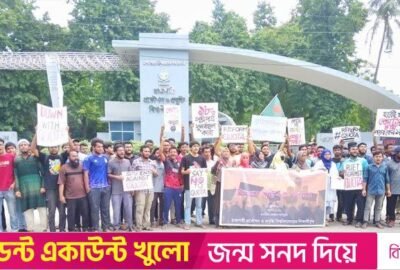Ready made garments, knitwear and textile owners’ associations BGMEA, BKMEA and BTMA have termed the proposed budget for the fiscal year 2024-2025 as disappointing. They made this comment at a joint press conference organized at BGMEA building in Dhaka’s Uttara on Saturday (June 8).
It was said in the press conference that we expected the budget to have some policy support for the garment industry. In particular, we had and still have strong hopes to bring down the tax at source to 0.5 percent and treat it as a final tax. Besides, there were other expectations – exemption of income tax on incentives in the budget, VAT exemption of various goods and services required by the industry, removal of complications related to HS code and weight, reduction of income tax on ERQ from 20 percent to 10 percent, tax on imports for replacement of fire and safety equipment. There will be announcements of concessions, withdrawal of 7.5 per cent VAT on textile waste and 15 per cent VAT on supply of recycled fibres, etc., which did not come up in the budget. It is disappointing for us.
In the context of the proposed budget for the fiscal year 2024-25, it was said in the press conference that a contractionary budget has been proposed for the fiscal year 2024-25 with multifaceted challenges in the harsh reality. Controlling inflation has been given priority over achieving higher growth. The GDP growth target has been set at 6.75 percent and the inflation target has been set at 6.5 percent. Education and skilled human resource development, employment, agriculture, power and energy, infrastructure and social security sectors have been prioritized in the budget. These are the positive aspects of the budget.
In the press conference, business leaders said that although inflation has been highlighted as one of the main challenges several times in the speech, controlling inflation will be the biggest challenge in the next financial year, especially due to the decrease in foreign exchange reserves. However, although some policy support has been proposed for this major foreign exchange earning sector, our main proposals to deal with the current difficult situation have not been reflected in the proposed budget. However, we welcome the helpful proposals for the textile and apparel industry, notably – 20 percent of the amount claimed in VAT appeals. It has been reduced to 10 percent. Import facility of 17 different textile products at subsidized rates has been provided. Total duty on import of chillers of 50 tonnes or more capacity for industrial plants has been reduced from 104.68 per cent to 10 per cent. Earlier it was a one percent concessional import provision. We again request that it be allowed to be imported at a concessional rate of one percent.
It was said in the press conference that a special allocation of Tk 100 crore has been given to encourage renewable energy. The import duty of two raw materials used in the production of polyester fiber (PSF) and pet chips (textile grade) has been reduced from 10 and 25 percent to one percent. These are undoubtedly helpful for the industry. However, there are several proposals made in the budget which we feel will not be helpful for investment and job creation. For example: proposal to increase the import duty from five percent to 10 percent on various types of construction materials used in the construction of steel buildings; Fixation of zero percent to one percent import duty on capital components and construction materials by establishments located in economic zones; Proposal to increase VAT on energy efficient lamps from five percent to 15 percent; Proposal to set new bond license fee at Tk 1000 instead of Tk 50000 and license renewal fee at Tk 10000 instead of Tk 5000 annually.
The business leaders told the press conference, you know that the global recession and high inflation caused by geopolitical reasons and the increase in interest rates in various countries to control it have reduced the purchasing power of consumers without overcoming the Covid pandemic. At the same time, commodity prices have fallen and production costs at the local level have risen by about 50 per cent over five years. As a result the industry is going through a critical situation. You must have noticed that in the 11th month of the current financial year, the growth of our garment exports has come down drastically. Only in May it decreased by 17 percent. We have increased wages by 56 percent, but our prices have not increased. Rather, in the last 9 months, the prices of our main products have fallen by 8 to 18 percent. When the industry is in such a critical situation, it is most necessary to support the garment industry, which earns the bulk of the export earnings, and thereby control inflation by increasing reserves.
IHO/MMAR/ASM






